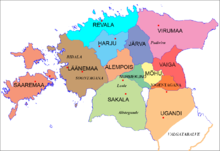Sakala County
| Sakala Sakala | |||||||
|---|---|---|---|---|---|---|---|
| county of Ancient Estonia | |||||||
| unknown | |||||||
 | |||||||
| Capital | unknown | ||||||
| Area | |||||||
| • Coordinates | 58°20′N 25°20′E / 58.33°N 25.33°E | ||||||
| History | |||||||
• Established | unknown | ||||||
• Disestablished | unknown | ||||||
| |||||||
Sakala County (Estonian: Sakala, Latin: Saccalia)[1] was an ancient Estonian county [2] that was first mentioned in print by Henry of Latvia in the early 13th century.[3]
Geography
Sakala County is in northwestern Livonia, covering approximately the present counties of Viljandi, the southern half of Pärnu and the western third of Valga County. It was the southernmost of the ancient Estonian counties.
History
According to one hypothesis, the tribe of Sosols mentioned in Old East Slavic chronicles implies the people of Sakala. The chronicles say that Kievan Rus organized military campaign against Sosols in 1060 and taxed them. A year later, Sosols rose, destroyed Kievan Rus fort in Tartu and attacked Pskov.[4]
After the Livonian Crusade, the county became a part of the Livonian Confederation.
In Sackalian folklore, the neighbouring Ugaunians (ugalased) were enemy warriors and robbers. For instance, a folk song from Viljandi, the capital of Sackalia, calls for speeding up the harvest work because the Ugaunians might attack.[citation needed]
See also
References
- ^ Historical Dictionary of Estonia; p.63 ISBN 0-8108-4904-6
- ^ p31, History of Estonia, 2nd Ed., Tõnu Tannberg, et al. AS Bit 2002, ISBN 9985-2-0606-1
- ^ The Chronicle of Henry of Livonia ISBN 0-231-12889-4
- ^ Mäesalu, Ain (2012). "Could Kedipiv in East-Slavonic Chronicles be Keava hill fort?" (PDF). Estonian Journal of Archaeology. 1: 199. Retrieved 27 December 2016.
